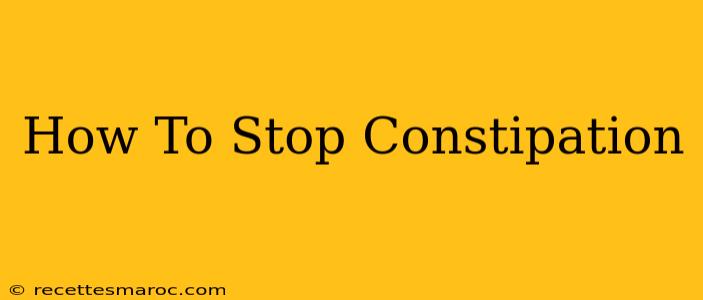Constipation is a common problem, affecting millions worldwide. It's characterized by infrequent bowel movements, difficulty passing stools, and hard, dry feces. While occasional constipation isn't usually cause for alarm, chronic constipation can significantly impact your quality of life. This comprehensive guide explores various effective strategies to alleviate constipation and promote regular, healthy bowel movements.
Understanding the Root Causes of Constipation
Before diving into solutions, it's crucial to understand what might be causing your constipation. Several factors can contribute:
Dietary Habits:
- Lack of Fiber: A low-fiber diet is a primary culprit. Fiber adds bulk to your stool, making it easier to pass.
- Dehydration: Insufficient water intake hardens stool, making elimination difficult.
- Processed Foods: These often lack fiber and can slow down digestion.
- Dairy Products: For some individuals, dairy can worsen constipation.
Lifestyle Factors:
- Lack of Exercise: Physical activity stimulates bowel movements.
- Ignoring the Urge: Delaying bowel movements weakens your bowel's natural reflexes.
- Stress: Stress can disrupt the digestive system's function.
- Medications: Certain medications, such as opioids and antacids, can cause constipation as a side effect.
Medical Conditions:
In some cases, underlying medical conditions like irritable bowel syndrome (IBS), hypothyroidism, or colon cancer can contribute to constipation. If you experience persistent or severe constipation, consult a doctor to rule out any underlying medical issues.
Effective Strategies to Relieve Constipation
Now, let's explore practical steps you can take to relieve constipation naturally and effectively:
1. Increase Your Fiber Intake:
- Gradually increase your fiber intake: Start slowly to avoid gas and bloating. Aim for 25-30 grams of fiber per day.
- Excellent sources of fiber include: fruits (berries, apples, pears), vegetables (broccoli, spinach, carrots), whole grains (oats, brown rice, quinoa), and legumes (beans, lentils).
- Consider a fiber supplement: Psyllium husk or methylcellulose are good options, but always follow the dosage instructions.
2. Stay Hydrated:
- Drink plenty of water: Aim for at least 8 glasses of water daily. Water helps soften stool and makes it easier to pass.
- Other fluids: Include herbal teas, clear broths, and fruit juices (in moderation) in your fluid intake.
3. Incorporate Regular Exercise:
- Aim for at least 30 minutes of moderate-intensity exercise most days of the week. Walking, swimming, cycling, or any activity that gets you moving can help stimulate bowel movements.
4. Listen to Your Body:
- Don't ignore the urge to have a bowel movement: Promptly responding to the urge can prevent stool from becoming hard and difficult to pass.
5. Manage Stress:
- Practice stress-reducing techniques: Yoga, meditation, deep breathing exercises, or spending time in nature can help alleviate stress and promote better digestion.
6. Consider Over-the-Counter Remedies:
- Stool softeners: These medications help add moisture to the stool, making it easier to pass.
- Osmotic laxatives: These draw water into the intestines, softening the stool.
- Stimulant laxatives: These stimulate bowel contractions to promote bowel movements. Use these only as directed by a doctor, as overuse can lead to dependence.
7. Dietary Adjustments:
- Limit processed foods, red meat, and dairy (if necessary).
- Increase your intake of probiotics: Yogurt with live cultures and fermented foods can support gut health.
When to See a Doctor
While many cases of constipation can be managed at home, it's essential to consult a doctor if:
- Constipation is persistent or severe.
- You experience significant abdominal pain or discomfort.
- You notice blood in your stool.
- You experience unintended weight loss.
- You have difficulty passing gas.
Chronic constipation can be a symptom of a more serious underlying medical condition. Don't hesitate to seek professional medical attention if your symptoms are concerning.
This guide provides a starting point for managing constipation. Remember that consistency and a holistic approach are key to achieving long-term relief. By incorporating these strategies into your daily routine, you can promote regular bowel movements and improve your overall digestive health.

